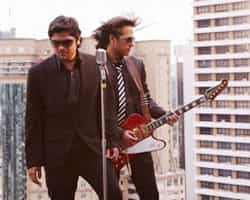Tough border to breach
The Indian visa might be difficult for Pakistani musicians to obtain, but that won’t deter them at all from coming here to hold concerts
At IIT Bombay’s Mood Indigo festival in December 2010, among the many musical groups slated to perform live were Pakistani pop rock band Strings. But due to diplomatic bottlenecks between India and Pakistan, the plug was pulled on them only sometime before the show. The open-air concert, a much-hushed up affair to begin with, was part of the band’s three-city tour of India. While the Mumbai leg remained cancelled, the band played Gurgaon and Hyderabad anyway.

Ordinarily, that would dissuade any group from visiting the country again. But not Faisal Kapadia, vocalist, or Bilal Maqsood, guitarist. Strings has plans to fly down in February to record with Delhi-based band Euphoria, and also hold concerts. Because this was only one of many times musicians from Pakistan have had problems in India doing what they do.

“Terrorism is the issue, and it’s everywhere. But if you notice, Pakistan is suffering the most because tragedies have occurred here regularly,” Kapadia says. Among the reasons that keep Pakistani bands from coming to India frequently is visa clearance.
Visa problems
In October 2010, sufi rock artiste Mekaal Hasan’s performances in Jodhpur, Delhi and Mumbai were cancelled as his visa application was processed only after the dates for his shows had passed. “The Indian High Commission in Pakistan told us that there wasn’t any point in going to India as it was already too late,” says Hasan, singer.
Government rules on either side aren’t alleviating matters either. Pakistanis cannot visit India more than three times a year; they cannot stay for more than a month; they have to get separate permission from each city they wish to visit; and in many cases also report to a police station every 48 hours.
Adds Hasan, “If denying visas to either side is going to prevent us from celebrating our common heritage, it will be proven that the more you repress art and music, the more people want to hear or see it.”
Almost all across this clique, the belief is that fans keep the music — and hope — alive. Pakistani musicians know that their songs are widely appreciated here, and they seem to return the reverence not out of obligation but admiration. Salman Ahmad of sufi-rock band Junoon refers to his 2008 Srinagar concert as the ‘most inspired’ performance of his life. “Indian fans showed me that the guitar is more powerful than the gun. Only music can bring people together and break walls,” he says. Ahmad will be here on January 21 to promote his book Rock and Roll Jihad at the Jaipur
Literature Festival.
In 2008, fusion rock duo Zebunnisa Bangash and Haniya Aslam were not given permission to perform in Chennai after the 26/11 attacks. But it was encouraging for them to discover an Indian fan base that knew them from Coke Studio, an initiative by musician Rohail Hyatt where Pakistani musicians collaborate to perform unplugged sessions. “Since music from both countries is heard by musicians and audiences on either side, we’d love to collaborate, maybe even on Coke Studio,” says Bangash, vocalist.
The discontentment isn’t with politicos; artistes feel that the public needs to be proactive about sorting things out. “There are ways in which politicians function, which may be proper — you can’t blame them. All we’re aiming for is that when people come to see our concert, they harbour good feelings for Pakistanis the same way we do for Indian musicians,” says Kapadia.
Start a dialogue
The industry now appeals for the youth to use modern means of communication to reestablish cultural diplomacy. Especially since new media has made it possible for fans from both sides to communicate with each other and the artistes. “Fans from India send me emails and tweets, and we share our love of music, film, books and food. It allows for a dialogue that wasn’t possible 10-15 years ago,” Ahmad says.
The general opinion is that with Twitter, Facebook and text messaging, social change can be brought about as these channels are open even in the worst of times. “Technology has become so pervasive, these links will only get stronger. Especially since there are so many aesthetic, historical and creative overlaps in our art and music,” adds Bangash.
It is evident that every musician is united on one front — to use art to counter hatred and anger. Says Hasan, “I’ve played in India since 2005; surely the authorities must have in-depth files on people like me. But if we aren’t trouble makers, why are we subjected to the same ridiculous procedures again and again?”
Get more updates from Bollywood, Hollywood, Music and Web Series along with Latest Entertainment News at Hindustan Times.



